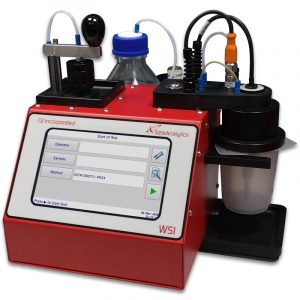Water Separation Instrument , WSI Analyser, SA9000-0
- Defence Standard 91-091 now includes WSI – ASTM D8073, IP624 as an alternative test for Water Separation at point of manufacture
- JIG Bulletin 150 issued – The preferred method for testing fuels containing a Static Dissipator Additive [SDA] downstream of the Point of Manufacture is now WSI – ASTM D8073, IP624
- ASTM D1655 allows the use of WSI – ASTM D8073 as downstream test for fuels
Stanhope-Seta is pleased to announce the inclusion of ASTM D8073 in Defence Standard 91-091 Issue 16, Table 5 as an alternative to ASTM D3948 for the measurement of water separation in aviation turbine fuels at point of manufacture.
JIG Bulletin 150 has now been released with updated information on the use of ASTM D8073, IP624 and confirming that:
- The preferred method for testing fuels containing a Static Dissipator Additive [SDA] downstream of the Point of Manufacture is ASTM D8073
- For fuels containing an SDA the preferred method is ASTM D8073, and ASTM D7224 is not recommended
WSI is a fully automated instrument that uses the latest generation filter media.
The WSI test is not only quick, operators don’t need to be specially trained, all they need to do is insert the sample and the rest of the procedure is fully automated. Most importantly, time isn’t wasted re-running tests or trying to understand results as the instrument displays a clear result and easy to read graph.
WSI’s fully automatic ‘right first time’ approach, combined with a substantial consumable cost saving per test and in field calibration capabilities, provides substantial savings to refineries and test houses. Additionally, the WSI instrument ensures the Water Separation Characteristics of the fuel is reported accurately
New WSI replaceable filter media cartridges with re-useable filter bodies mean substantially less waste, and easy disposal of the small filter after each test. Cost per test are approximately 50% lower than legacy methods.
Background information
Water separation in jet fuel is measured as a key indicator of quality assurance throughout the supply chain, from refinery to aircraft. Surfactants, or surface active agents in the fuel can affect the ability of filters in the distribution network to remove entrained water through coalescence.
The ability of fuel to shed water is known as its water separation characteristic. It is important to measure this property as it determines whether the fuel in question contains materials that will disarm or disable the filters. Aviation turbine fuel specifications including Defence Standard 91-091 and ASTM D1655 mandate the testing for surfactants.
Test methods ASTM D8073 and IP 624 provide a rating of the fuel sample by reporting a WSI (water separation index) rating number. The WSI rating adopts the same surfactant scale as existing water separation characteristic methods ASTM D3948 and ASTM D7224. ASTM D8073 was published in 2016 and supports the innovative WSI instrument (SA9000-0) manufactured by Stanhope-Seta and D-2 Incorporated.
The WSI instrument has been the subject of the most exhaustive trials ever conducted on Water Separation Instrumentation, proving to show a near 100% accuracy rate in determining separation characteristics of aviation turbine fuels.
The ASTM D8073 test method and WSI instrument represent a simple alternative to legacy methods which are widely acknowledged to be highly variable, in some cases requiring both repeat and supplemental tests to confirm the results.
The WSI test is not only quick, operators don’t need to be specially trained, all they need to do is insert the sample and the rest of the procedure is fully automated. Most importantly, time isn’t wasted re-running tests or trying to understand results as the instrument displays a clear result and easy to read graph.
WSI’s fully automatic ‘right first time’ approach, combined with a substantial consumable cost saving per test and in field calibration capabilities, provides substantial savings to refineries and test houses. Additionally, the WSI instrument ensures the Water Separation Characteristics of the fuel is reported accurately.
Matt Fielder, Market Development Manager at Stanhope-Seta noted, “Publication of ASTM D8073 into the international standard for jet fuel represents a significant step forward for the WSI. ASTM D8073 and the WSI instrument has been designed to provide a fully automated approach to water separation testing whilst providing accurate and precise results.” He added, “From an economic perspective, when you consider ongoing consumables, waste costs and labour costs, the WSI provides a highly cost effective solution to water separation testing compared to alternative instruments.“
For more information or to request a quote, visit the WSI webpage >
